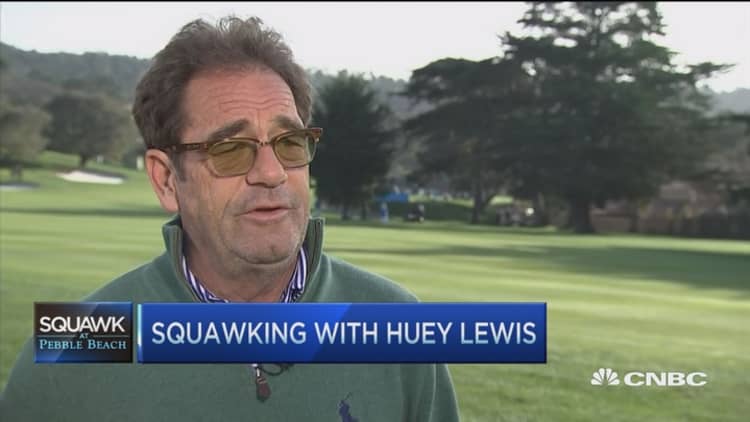
As far as markets go, rock legend Huey Lewis doesn't need a new drug.
Lewis invests for the long haul, and the stomach-churning volatility in stocks since the start of 2016 doesn't bother the 80's hitmaker.
"I think it's looking for a bottom somewhere. I'm an investor, I'm not a speculator. So I just sit tight," he told CNBC's "Squawk Box," in an interview last week from the AT&T Pro-Am golf tournament in Pebble Beach. "But I think we had an amazing run, so this is a correction of sorts," he added.
"If you just buy blue-chip stocks that pay dividends and hang on, you're gonna be fine," he argued, saying he mainly puts his money in a "nice little blend" of mutual funds. "I buy funds. I'm a fund guy. If I was a stock guy, I would have to watch the market every day. I can't do that. I'm out playing harmonica and golf."
Free music? Not a fan
While the volatile market doesn't ruffle Lewis' feathers, free music on the Internet, however, is a whole other matter.
The power of the Internet has dramatically changed the music business over the years — first with fans moving away from buying entire albums and downloading individual songs to more recently listening to streaming services like Spotify, Pandora, and Apple Music. Lewis told CNBC he's not convinced the effect is entirely beneficial.
"I mean what's really interesting is to watch the Internet and the effect it's going to have. And I'm not sure it's good. I mean the Spotify and all this stuff," Lewis said.
"The Eagles ... made these wonderful records, but they were notoriously meticulous," he added. "It took a lot of time, a lot of money. How are you going to do that when records are free? It's actually a very worrisome thing. Where are these iconic bands going to come from?"

That said, Lewis feels his music has been sort of grandfathered under the old paradigm. "Fortunately, we were branded in the 80s when there was an editing process. Top 40 radio … determined who was going to get the attention and who wasn't." Now, with digital music and streaming ruling the roost, the process has evolved considerably.
"Now with less of that around, that brand is on the rise again, because there's less new bands coming out with that kind of branding, because of the Internet," he added.
Huey Lewis and the News is entering their 36th year together. The group was a hit machine in the 1980s and 1990s, with such songs as "The Power of Love," written and performed for the movie "Back to the Future." The song went to No. 1 on Billboard's singles chart.
The band has been touring ever since and are about to embark on a new adventure.
"We have a new record we're working on that will be out 'early this century,'" Lewis joked. "I don't even know why but we've written these four or five songs, which we're very excited about. So I think we have one more swing at it. We're going to work on the record a little bit, and then release it, and then tour hard."
'It's a corporate world'
Lewis also reflected on missing out a big payday in the early 1980s, when Coca-Cola wanted the band to do commercials. Singer Michael Jackson had just signed a record $5 million celebrity endorsement deal with Pepsi, which was huge at the time. But even so, Lewis passed on the Coke deal.
Asked by CNBC why he declined, Lewis said: "I don't know, because I was an idiot frankly. I'd never done anything — and I'd still never do anything — for money. We had just started selling out concerts, making more money than we'd ever made. And I thought why would I do this for money? I'm an artist. I'm an artist, and an idiot."
Today, he said he would not hesitate to do that kind of deal. "It's a corporate world. Where do hear real blues music? I mean Muddy Waters blues music. Not second generation, I mean first generation. Where do we hear it? On ads. Toyota ads."
"Our influences were bohemian in those days," he continued. "But now people who are my age in the corporate world, they're more bourgeois. They're bo-bos, if you will, bourgeois-bohemians, but their tastes are rooted … [in the 1960s]."





